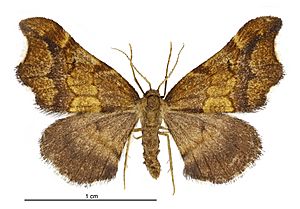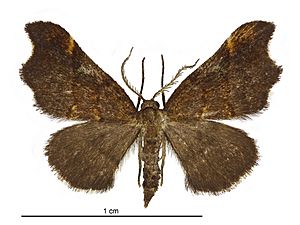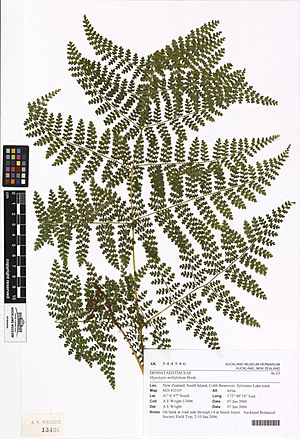Orange and purple fern looper facts for kids
Quick facts for kids Orange and purple fern looper |
|
|---|---|
 |
|
| Female | |
 |
|
| Male | |
| Scientific classification | |
| Kingdom: | |
| Phylum: | |
| Class: | |
| Order: | |
| Family: | |
| Subfamily: |
Larentiinae
|
| Genus: |
Paradetis
Meyrick, 1885
|
| Species: |
P. porphyrias
|
| Binomial name | |
| Paradetis porphyrias (Meyrick, 1883)
|
|
| Synonyms | |
|
Generic
Specific
|
|
The Paradetis porphyrias is a special kind of moth found only in New Zealand. It's the only species in its group, called Paradetis. This beautiful moth belongs to a family known as Geometridae, often called "geometer moths" or "loopers" because of how their caterpillars move. A scientist named Edward Meyrick first described both the group (genus) in 1885 and the species in 1883.
Contents
Discovering the Paradetis porphyrias Moth
This unique moth was first described by a scientist named Edward Meyrick. He first wrote about the species in 1883, calling it Parysatis porphyrias. A year later, in 1884, he shared even more details about it. Then, in 1886, Meyrick decided to give the moth's group a new name, changing it to Paradetis.
Another famous insect expert, George Hudson, also drew and wrote about this moth. He included it in his books New Zealand Moths and Butterflies (Macro-lepidoptera) (1898) and The Butterflies and Moths of New Zealand (1928).
What Does the Paradetis porphyrias Moth Look Like?
The female Paradetis porphyrias moth is about 20 millimeters (less than an inch) wide when its wings are spread. Its front wings are a mix of yellow-ochre, brown, and purplish colors. The veins on its wings are clearly visible and dark.
The wings have two thin, brownish lines that cross them. Beyond the second line, there's a wide purplish area. The very edge of the wing is also purple. The tiny hairs (cilia) on the edges of the wings are white in some places.
The hindwings (back wings) are a pale yellow-ochre mixed with dark brown and purplish colors. They also have a dark line across the middle and a very wide purplish band along the outer edge.
Where Does This Moth Live?
The Paradetis porphyrias moth is endemic to New Zealand. This means it is found naturally nowhere else in the world.
Edward Meyrick first found this species near Arthur's Pass at Otira Gorge in January. Since then, it has also been seen in other parts of New Zealand, including Mount Arthur, Castle Hill, and near Lake Wakatipu.
Home and Food for the Moth
According to Alfred Philpott, another scientist, these moths often visit the banks of mountain streams. This suggests they like damp, cool places.
The young moths, called larvae or caterpillars, likely feed on a plant called Hypolepis millefolium. This is a type of fern that grows in New Zealand.
 | Lonnie Johnson |
 | Granville Woods |
 | Lewis Howard Latimer |
 | James West |


